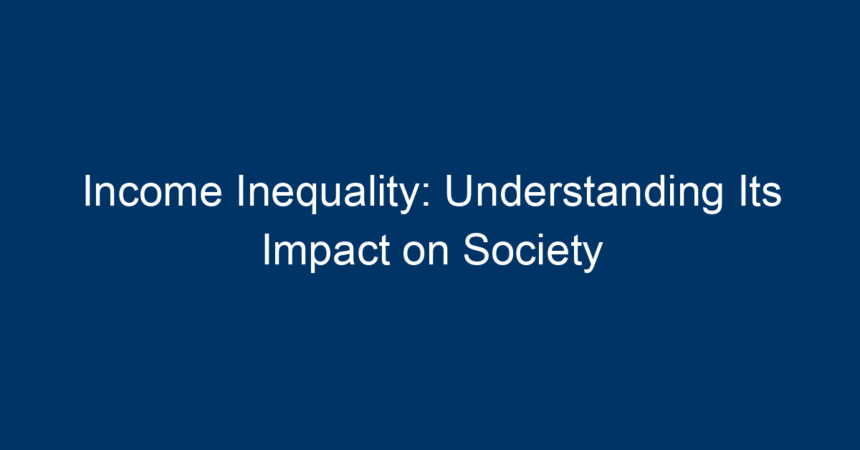Income inequality has become a focal point of socio-economic discussions in recent years, drawing attention from policymakers, academics, and the general public alike. As the gap between the wealthy and the poor continues to widen, understanding its implications is critical for fostering a more equitable society. This article delves into the nuances of income inequality, its causes, effects, and potential solutions.
What is Income Inequality?
Income inequality refers to the uneven distribution of income across different groups in society. It is often measured using statistical tools such as the Gini coefficient, which quantifies the disparity between the highest and lowest earners. A higher Gini coefficient indicates greater inequality. Social scientists and economists study income inequality to illustrate how wealth is concentrated within certain demographics, influenced by factors such as education, occupation, and geographic location.
The Current State of Income Inequality
According to recent reports, income inequality has reached alarming levels in many parts of the world. In the United States, for example, the top 1% of earners holds a significant share of the nation’s wealth. This concentration of wealth affects not only the economy but also social dynamics, as the affluent and the impoverished experience vastly different realities.
The Causes of Income Inequality
Understanding income inequality requires an examination of its underlying causes. Several factors contribute to this growing divide.
Globalization
Globalization has reshaped economies, enabling businesses to operate across borders. While it has led to economic growth in many regions, it has also created winners and losers. Skilled workers in developed countries benefit, while low-skilled laborers face stiff competition from countries with lower wage standards.
Technological Advancements
Advancements in technology have altered the labor market landscape. Automation and artificial intelligence increase productivity but often displace low-skilled jobs. As tech-savvy individuals command higher salaries, the income gap widens further—a phenomenon known as the skills gap.
Education Disparities
Educational attainment significantly influences income potential. Higher education levels generally correlate with better-paying jobs. However, access to quality education is not equal, often depending on socio-economic status, race, and geographical location. This educational divide perpetuates income inequality across generations.
The Social Impacts of Income Inequality
The consequences of income inequality extend beyond mere statistics; they resonate through all facets of society.
Health Disparities
Income inequality contributes to significant health disparities. Lower-income individuals often face barriers to accessing healthcare services, nutritious food, and stable housing. Consequently, they experience higher rates of chronic illnesses, mental health issues, and shorter life expectancies compared to their wealthier counterparts.
Educational Barriers
Children from low-income families often attend underfunded schools, limiting their opportunities for academic achievement. This cycle perpetuates a lack of upward mobility, as these children grow into adults without the skills needed to secure well-paying jobs.
Increased Crime Rates
Research indicates a correlation between income inequality and crime rates. Communities with high income disparity often experience lower social cohesion and higher crime rates, as individuals may resort to illegal activities out of desperation.
Erosion of Social Trust
Income inequality can erode social trust and community bonds. When people perceive that wealth is concentrated among a small elite, they may feel alienated and less likely to engage in civic activities. This discontent can lead to political instability and further polarization.
Addressing Income Inequality: Possible Solutions
While income inequality poses significant challenges, several strategies can help mitigate its effects.
Progressive Taxation
Implementing a progressive tax system ensures that higher earners contribute a fair share of their income back to society. By redistributing wealth, governments can fund social services, education, and healthcare, benefiting marginalized communities.
Education and Skill Development
Investing in education and vocational training can bridge the skills gap. Policies aimed at increasing access to quality education will empower individuals, enabling them to secure better-paying jobs and break the cycle of poverty.
Universal Basic Income (UBI)
Universal Basic Income is a proposed solution that advocates providing all citizens with a regular, unconditional sum of money. This approach could help alleviate poverty and provide a safety net for those facing economic hardships, ensuring that basic needs are met.
Strengthening Labor Rights
Empowering workers through stronger labor rights can help ensure fair wages and better working conditions. Supporting unions and collective bargaining initiatives allows workers to negotiate more equitable pay and benefits.
Promoting Inclusive Economic Growth
Encouraging policies that promote inclusive growth—such as small business support and fair wages—can create an environment where everyone benefits from economic advancements.
Conclusion: Taking Action Against Income Inequality
Income inequality is a multifaceted issue that calls for urgent attention. Understanding its causes and effects is crucial for creating actionable solutions that address the disparities faced by millions. While policymakers play a significant role, individuals can also contribute by advocating for change in their communities.
To tackle income inequality effectively, we must collectively push for progressive taxation, enhanced educational opportunities, and supportive labor policies. Raising awareness and engaging in discussions can catalyze meaningful reforms that foster a more equitable society.
In the fight against income inequality, every action counts. By working together, we can build a future where economic opportunity is not a privilege of the few, but a fundamental right for all.




